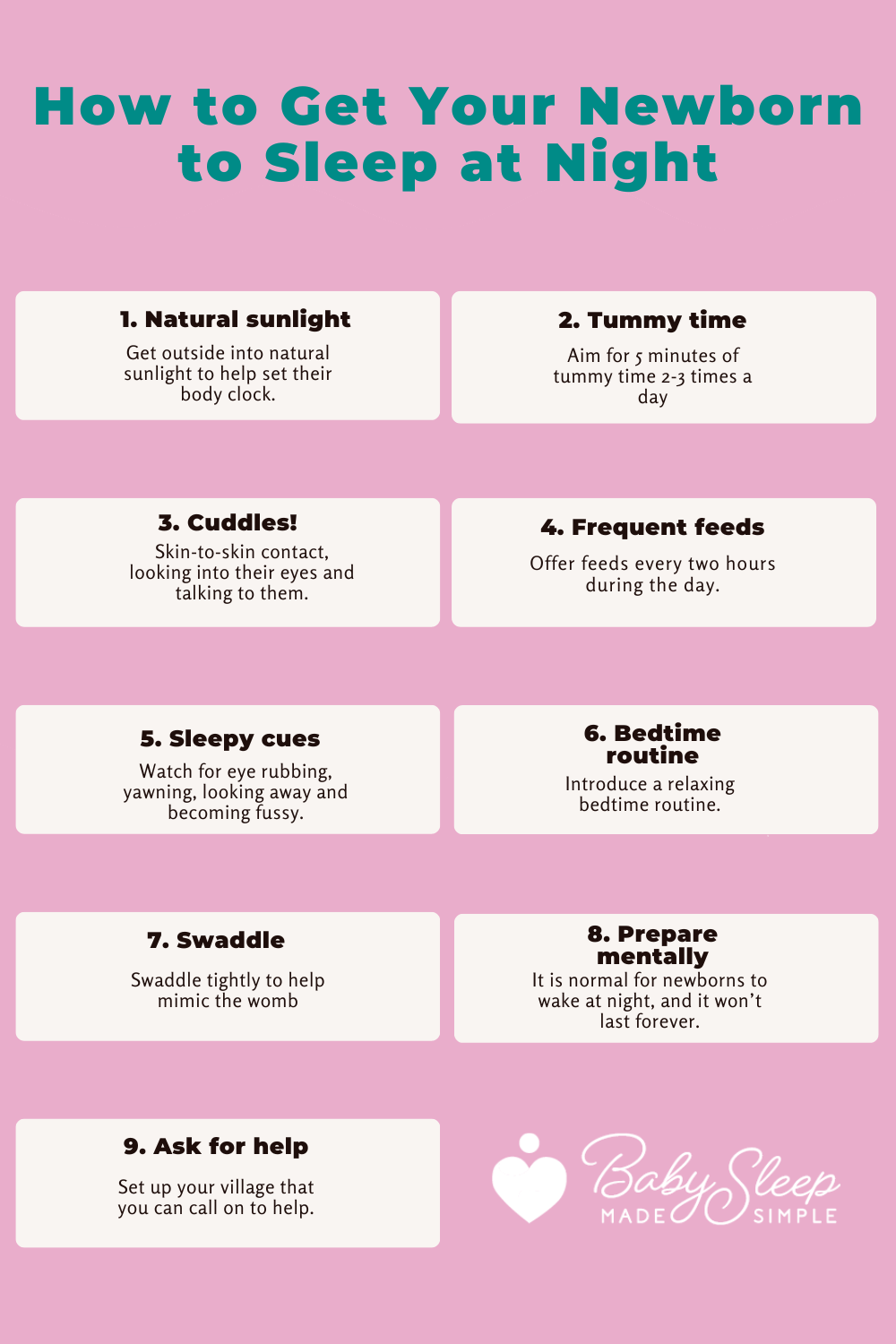There is nothing as wonderful as having your newborn placed in your arms and wrapping his or her fingers around yours for the first time. You’ve just spent months preparing for your newest addition and are so excited your baby is finally here!
At some point, though, sleep deprivation will start kicking in and you may start wondering if you will ever sleep again. Am I right?
Newborns sleep a lot, around 16 hours a day, but somehow this never seems to line up with when you need to sleep. You may start to think you’re going crazy trying to get your newborn to sleep well at night. Don’t worry! I promise you’re not alone.
This article will share everything you need to know about why your newborn sleeps all day and parties all night. More importantly, it will help you set a healthy sleep foundation to encourage the best rest possible for you and your newborn.
What you’ll learn:
- – Common Reasons Why Newborns Don’t Sleep at Night
– Day/Night Confusion
– Newborns get hungry at night
– Newborns are easily overstimulated
– Your newborn is cold, wet or gassy
– Your newborn wants to be close to you
– Your newborn can’t self soothe
– Middle of the night wakings are normal for newborns
- – 9 Tips to Get Your Newborn to Sleep at Night
– Get your newborn outdoors for natural sunlight
– Encourage active during the day
– Connect with your baby during the day
– Offer frequent feeds during the day
– Watch for your newborn’s sleep cues
– Start a relaxing bedtime routine
– Swaddle your baby (tightly!)
– Prepare yourself mentally
– Ask for help
I’m creating a Newborn Sleep Course. Click here and let me know what you’d like it to include.
Common Reasons Why Newborns Don’t Sleep at Night
Reason #1 – Day/Night Confusion
Does your newborn sleep well during the day, but seems ready to party as soon as the sun sets? Yep, mine did too.
Your newborn’s circadian rhythm (or “body clock”) hasn’t developed yet which means that he has day/night confusion.
You may have noticed when you were pregnant that your baby was more active at night than during the day. Just as you laid down to sleep, your baby was dancing away in utero. And conversely, during the day when you were standing upright and moving around all day it helped lull your baby to sleep.
This pattern of day/night confusion continues until around 6 weeks old when your baby’s circadian rhythm starts developing. At that point you can expect your baby to slowly start sleeping more at night and having more wakefulness during the day.
(Keep reading for more advice on how to help your baby overcome day/night confusion.)
Reason #2 – Newborns get hungry at night
Your newborn’s stomach is small. Specifically, at birth your baby’s tummy is the size of a toy marble and by day 10 it grows to the size of a ping pong ball. So tiny!
Because her stomach is so small, she can only take in so much milk per feeding. That’s why your baby needs to feed often (8-12 times per day). And some of these feedings need to happen at night.
Eating this often is normal and healthy for your newborn. Your baby will approximately double his or her birth weight in the first 4-6 months of life, so feeding often is necessary for them to achieve this tremendous weight gain.
Within the next month or two, your baby will be able to go longer between feeds overnight.
Reason #3 – Newborns are Easily Overstimulated
The world is a stimulating place for newborns. Before your baby was born, the womb provided a buffer for sound, light and touch. After birth, the first few weeks can be busy with everyone wanting to meet (and hold) your new baby.
As you get to know your newborn, you will learn what level of stimulation he can cope with without negatively impacting his ability to settle down and sleep.
Signs of over-stimulation in a newborn can be increased fussiness, crying and difficulty settling to sleep.
If you notice these signs (especially at a specific time of day like the evening) it can help to take them to a quiet space and feed, rock or wear your baby to help them settle.
And when it’s time to sleep, create a safe baby sleep space for them.
Reason #4 – Your newborn is cold, wet or gassy
Your newborn has just come from the womb where she was always the right temperature, never hungry, and perfectly comfortable.
Suddenly, in the outside world newborns are having to regulate their own temperature, deal with wet diapers, and learn how to digest milk. These are all valid reasons why your newborn baby won’t sleep at night.
It can take time to adjust and be comfortable with all of these new processes!
Also, your baby might get particularly gassy after feeds, and this can disrupt your newborn’s sleeping patterns. The tips in this article will help with this. Keep reading…
Reason #5 – Your newborn wants to be close to you
Your new baby isn’t used to being alone. Newborns are accustomed to hearing the sounds of the womb, feeling Mom’s heartbeat, and being together with you 24/7.
Being without you (in the bassinet, car seat or someone else’s arms) can be upsetting for them as they actually feel like they are an extension of Mom at this young age.
This doesn’t mean you can never put your newborn down or get help from others. Ask loved ones to wear your newborn in a baby carrier or do skin-to-skin so your baby can get the close contact they desire.
Check our my free guide for all the tips you need to get your newborn to accept the bassinet.
Reason #6- Your newborn can’t self-soothe
As your newborn gets older they will learn to transition smoothly between sleep cycles and sleep long stretches at night. At this age, though, they’re not developmentally ready to learn this skill.
This means that it’s completely normal for your baby to need your direct help falling asleep, and staying comfortable and content.
Rocking, bouncing, swaying, feeding and singing to your baby are great ways to soothe your baby when they get fussy at night.
Reason #7- Middle of the night wakings are normal for newborns
Middle of the night wakings are normal for newborns as they get used to life in the outside world. It’s exhausting as a new parent, but luckily it’s short-lived.
Night wakings for hunger, discomfort, gas or just needing some reassurance are completely natural newborn sleep patterns.
When my babies were newborns I made sure that I took “a nap” from 8-11 pm while my husband or grandma watched the baby. Getting that solid chunk of sleep helped me handle the middle of the night wakings when I was up breastfeeding my newborn and trying to get them back to sleep.

9 Tips to Get Your Newborn to Sleep Better at Night
Tip #1 – Get your newborn outdoors for natural sunlight
Helping your newborn learn the difference between nighttime and daytime is a great way to set their circadian rhythm and stop their day/night confusion. This will help your baby slowly understand that night time is for sleeping and daytime is for awake activities like eating and playing.
Your baby’s circadian rhythm develops in the first few months and light is a strong factor with setting the body clock.
During the day, get your newborn outside into natural light as much as possible, especially first thing in the morning. Your baby doesn’t need to be directly in the sun (and risk getting sunburned). Getting outside is enough.
When you’re indoors, keep the curtains open to let light in and don’t worry about everyday household noises distracting your newborn from napping. Most newborns can sleep in bright, noisy spaces just fine.
During the evening hours, keep the lights low throughout the house and try using a red or orange night light in the bedroom for overnight feeds. Keep the bedroom quiet and encourage your baby to go back to sleep as soon as she has been fed and changed.
Find more information on how to get your newborn on a sleep schedule here.
Tip #2 – Encourage active time during the day
Introducing short periods of active time during the day allows your newborn to burn some energy, build up his muscles, and relieve gas pains. This is one of my best tricks to get a newborn to sleep at night.
“Tummy time” can help trapped gas (which can cause discomfort overnight) pass more easily. Aim for 5 minutes of tummy time 2-3 times throughout the day. Do this before feeds to minimize spitting up.
Tip #3 – Connect with your baby during the day
This sounds silly, doesn’t it? Clearly, you are spending all of your time with your sweet newborn. But, having lots of close contact during the day can relax your newborn so they sleep more easily at night.
Make sure to have skin-to-skin contact daily, looking into your baby’s eyes and talking to them, so they feel that special connection with you.
Sleeping in the same bedroom as your baby allows them to feel close, while also allowing you to get some well-needed rest. Place your newborn’s crib or bassinet next to your bed. Here’s more advice on setting up a safe sleep space for your baby.
Remember that the American Academy of Pediatrics recommends room-sharing but not bed-sharing, for safety reasons. You can find advice here on how to stop co-sleeping.
Tip #4 – Offer frequent feeds during the day
Your newborn’s stomach is tiny right now and she needs to feed frequently, between 8 to 12 times every 24 hours. But it’s never too early to put an extra focus on daytime feeds.
Offering feeds every two hours during the day can help your baby sleep longer stretches overnight (once they are developmentally ready).
Make sure to ask your baby’s doctor how often they need to feed overnight. Nutrition and weight gain should take priority in the newborn phase.
It also helps to limit each nap during the day to two hours maximum so that your baby can have some time awake (to set their circadian rhythm) and feed frequently during the day (so they don’t want to eat all night!).
It’s ok if your newborn only wants to be awake for 30-60 minutes between naps. This is normal at this age.
Also, try to keep your baby awake during daytime feedings in order to help them take a full feed.
If you are breastfeeding, you can offer one breast, then take a break to burp and change your baby’s diaper (which will keep them awake). Then, offer the second breast.
Tip #5 – Watch for your newborn’s sleepy cues
Learning your newborn’s sleepy signs can help prevent over-tiredness, which can cause your newborn to fight sleep.
Key signs to look for are: rubbing their eyes, looking away from you, yawning, or becoming fussy. When you see these signs, offer your baby a nap. You can learn about newborn wake windows here.
For some babies, sleepy signs can be very subtle, so using a sleep tracking app like Huckleberry can help you keep track of how long your newborn has been awake and when they should have their next nap.

Tip #6 – Start a relaxing bedtime routine
Introducing a relaxing bedtime routine early on can help your newborn wind down at the end of the day and easily transition from daytime to bedtime.
It’s a great time to connect with your baby and it can be short and sweet while they are still so young.
For help getting your newborn to actually sleep in the bassinet at the end of your bedtime routine check out my free guide.

Tip #7 – Swaddle your baby (tightly!)
All newborns have a moro reflex which causes them to startle. It’s when your baby seems to be having a dream that they’re falling and they stretch out their arms and legs.
This reflex is developmentally normal and will gradually disappear around 3-4 months old. When your baby is lying on his back, the moro reflex can cause him to startle himself awake.
Swaddling your newborn not only helps to mimic the womb, but can also dampen your baby’s moro reflex and prevent them from waking up! So start swaddling your baby for nighttime sleep tonight.
Make sure to check out my article on the safest sleep position for your newborn.
Here are my favorite newborn swaddles on Amazon.
Tip #8 – Prepare yourself mentally
Newborn sleep is unpredictable. That’s a given. You will have good nights and you will have nights where you just can’t figure out why your newborn baby won’t sleep.
The best way to prepare yourself is to have realistic expectations. Remember that it’s normal for newborns to wake at night. They’re hungry and they still don’t know the difference between day and night.
Also, your newborn’s systems are immature. This means that some days they might settle easily and take long naps and other days they may be restless, want to be on the breast all day and only nap for ten minutes. This phase won’t last forever, though, I promise!
Also, remember that you’re not alone in this. When my daughter was born, I used to remind myself during 3 am feeds that somewhere out there were lots of other moms awake at night caring for their babies. It helped me feel less alone.
Check out my article on surviving the first year of motherhood.
Tip #9 – Ask for help
Becoming a parent is life-changing and tough, so don’t try and do it alone. Asking for help is essential, it really does take a village to raise a baby.
Set yourself up for success with these ideas:
- Have someone you can call on days where your newborn is extra fussy.
- Set a schedule up with your partner to share some night shifts, or maybe they get up with your baby in the morning and you get to sleep in.
- Find other newborn moms. Being in the trenches with others in the same position can be so helpful and reassuring. Find local mom groups in your area or join some Facebook groups.
Wrapping up
Having a newborn is wonderful and exhausting in equal measure.
Your whole world has been turned upside down, but so has your newborn’s! And it will take time to get to know each other, establish a daily routine and get your newborn to sleep well at night.
Disrupted sleep and unpredictable days are very normal in the newborn stage. While you’re going through it, it may feel like you will never sleep again, but I promise that you will. As your newborn develops, she will naturally start to sleep better and longer.
If you are struggling with your baby’s sleep, we would love to help you with a private consultation to get your newborn to sleep well at night and settle into a daily routine.
If your newborn is fussy all day long, seems to be in pain or isn’t feeding well, and your instinct is telling you that something is wrong, reach out to a medical professional.
If you want to stay up-to-date with sleep tips catered for your baby’s age as they grow, join my Sleep Secrets Newsletter here!
FAQs
How much sleep does a newborn need at night?
Unfortunately for parents, this sleep is often in short phases because newborns need to feed frequently.
Can my newborn sleep at night without feeding?
Most babies are not able to sleep through the night without feeding until 6-8 months old.
Encouraging your newborn to feed more frequently during the day can help to stretch the times between feedings overnight, but always check with your baby’s doctor about how frequently your newborn needs to feed overnight.
How to get my newborn to sleep at night?
When do babies start sleeping through the night?
Most 5-8 month-olds can sleep through the night (with one feeding). And 9-12 month-olds can sleep through the night without feeding. Find out how to do this with my sleep program.
It is always worth checking in with your baby’s doctor about how many night feedings are appropriate for your baby.
















0 Comments